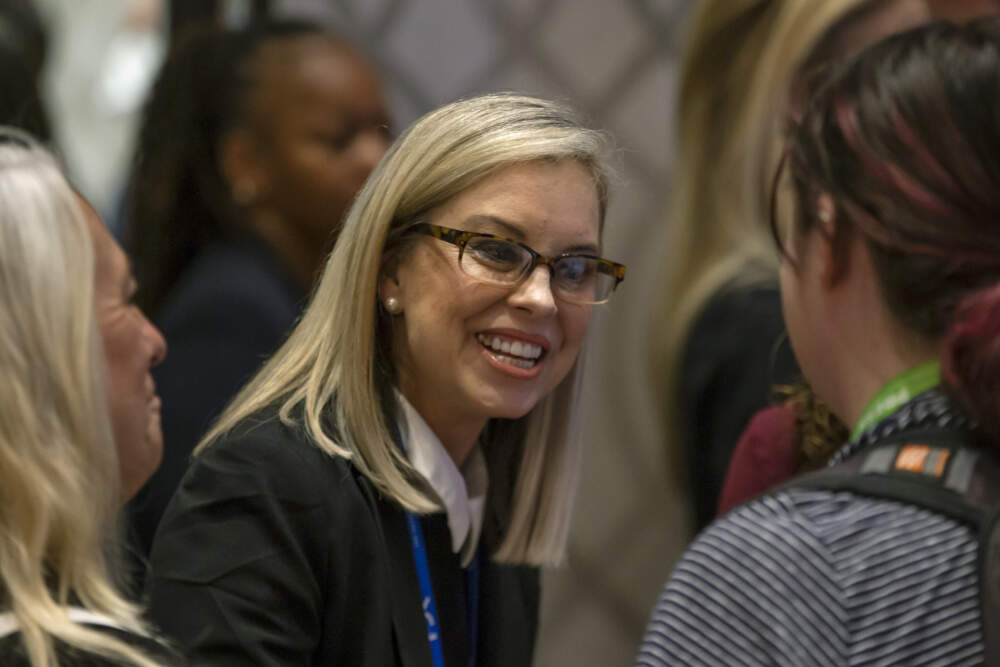Advertisement
Reno mayor on mental health access: 'If your mayor can't find help, who can?'

Editor's note: If you or someone you know may be considering suicide or is in crisis, call or text 988 to reach the Suicide & Crisis Lifeline.
The mayor of Reno, Nevada, Hillary Schieve, has made mental health one of her top priorities in office — and it's personal.
In the past few years, she juggled the responsibility of leading a city during the pandemic and winning re-election for a third term. Schieve also lost three family members who struggled with depression, bipolar disorder and addiction.
Schieve didn't open up about her family's story until after the death of her sister, Grady, her brother, Noah, and her brother-in-law, Lance.
“It's something that I sort of grew up with my whole life – watching my sister struggle from paralyzing depression,” she says. “It was sort of this dark secret in my family that I think so many families struggle with and we don't talk about it.”
Schieve is now the new president of the U.S. Conference of Mayors and trying to use that platform to help other cities get support for the unrelenting mental health crisis in America.
Her string of personal tragedies started in 2020 when the pandemic was begining, businesses were closing and people were staying home.
Publicly, the mayor was taking care of her city. Privately, she was confronting the fact that her sister was diagnosed with breast cancer.
Initially, it was stage one. She’d had a double mastectomy and the debilitating depression she had managed her whole life made her feel paralyzed.
Months later, Schieve found out Grady had stopped going to doctor’s appointments.
“She said, ‘I'm so depressed, I can't get out of bed,’” Schieve says. “She even said to me, ‘Hillary, I would much rather have cancer than depression.’ That's how debilitating her depression was.”
Advertisement
Schieve moved Grady into her house to take care of her. Then they found out her cancer had moved to stage four.
Four months later, Grady died.
“On her death certificate, it will say breast cancer,” Schieve says. But really, it was her mental health that she had struggled with.”
Six weeks later, Schieve’s brother Noah was found dead, related to drug addiction issues.
“There were so many [incidents] with my brother, when he was having a bipolar episode [and] we didn't know where to turn for help,” Schieve says. “Oftentimes what's so sad about these struggles is the only place to turn is calling the police. And we shouldn't have to call the police to get our loved ones mental health help.”
Three months later, she says her brother-in-law, Lance — Grady’s partner — called.
“He was really struggling with the loss of my sister and needed to be checked into a program,” Schieve says. “I had said, ‘Absolutely, let me help you and meet me at the hospital’ … And he never showed up. So I had someone go out and do a welfare check and he was found dead … And so all of this is all-encompassing to mental health and addiction.”
Schieve remembers thinking she needed to talk to someone about the grief because it was so overwhelming.
“It was incredibly challenging,” she says. “I was working all the time and trying to be strong for my city and not processing this massive grief that I had.”
She started to call providers in town for help.
“I didn't tell them that it was me. I was afraid — there's a massive stigma. And also, I didn't want to have special treatment either,” Schieve says. “So I actually used an alias.”
Providers told her they couldn’t squeeze her in for at least six to eight weeks.
She was eventually able to talk to someone, but the experience propelled her to make changes so that everyone can have access to mental health support.
“If your mayor can't find help, who can? If your mayor isn't talking about it, then who is?” she says.
Schieve says she used American Rescue Plan money — pandemic relief dollars — to make sure every resident had access to online talk therapy.
Almost half of those who used it had never sought out therapy before.
If she could do one thing now, she would build recovery centers because “we need that more than anything.”
“Even if you have great insurance, it’s still very difficult to get access,” Schieve says. “I think what people don't understand, too, is that cities are fighting this at ground zero… We send in our police officers to deal with the mental health crisis and we should be sending in physicians … But the cities don't get funding. [Money goes] to the state and then to the county. And there's a lot of people that are dying on our streets — that is absolutely inhumane because there is no place to take them and we have to take a different approach.”
Schieve says she’s lucky to be surrounded by a lot of support as she continues the work that brings her joy. But some days are harder than others.
“I think anyone that's lost someone that they love tremendously suffers with traumatic grief. And that can be very, very hard to get over,” she says. “So I hope my mission is to move forward and help others be able to get the services and treatment that they need.”
Ashley Locke produced and edited this interview for broadcast with Todd Mundt. Locke also adapted it for the web.
This segment aired on July 3, 2023.

